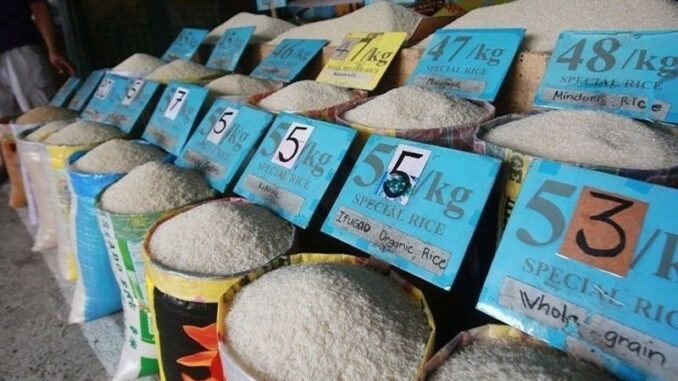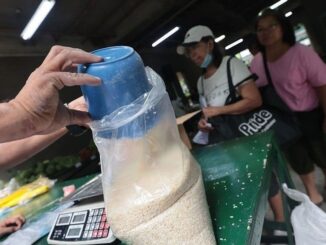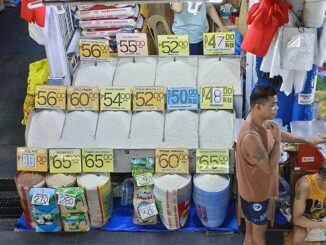
MANILA, Philippines — Despite lower tariff, rice prices have remained high due to price manipulation by cartels and unscrupulous businessmen, a finance official said yesterday at a legislative hearing on alleged anomalies in the supply and distribution of the commodity.
Under questioning by Iloilo Rep. Janette Garin at the continuation of the hearing by the quinta committee, Department of Finance director Jolly La Rosa said that in a “perfect competition,” prices of rice in the country should have gone down since the implementation in July of Executive Order No. 62 reducing tariff on rice from 35 percent to 15 percent.
“There is a big possibility (of rice price cut). That could be a possibility. That is the only thing that I can think of,” La Rosa said.
“If we will turn a blind eye on this, Mr. Chair, the Philippines will go nowhere,” Garin said in reaction, referring to La Rosa’s statement. “Every household must have food on the table.”
Garin said that in July, no less than Finance Secretary Ralph Recto had expressed optimism that the tariff cut would result in a 10-percent reduction in retail prices of rice for the rest of the year.
The quinta panel comprises the committees on ways and means, trade and industry, agriculture and food, social services and the special committee on food security. Its overall chair is Albay Rep. Joey Salceda.
The committee is investigating possible collusion among rice importers and traders in manipulating the prices of the staple.
“The committee focused on top importers because there were clear signs of speculation in the rice import market, such as swelling commercial inventories, delays in withdrawals by importers and imports surpassing USDA (United States Department of Agriculture) projections,” Salceda said at the hearing. The top 10 rice importers control 36 percent of total inbound shipment.
They were identified as Bly Agri Venture Trading, Atara Marketing Inc., Orison Free Enterprise Inc., Macman Rice and Corn Trading, King B Company, Sodatrade Corp., Lucky Buy and Sell, Vitram Marketing Inc., Nan Stu Agri Traders and RBS Universal Grains Traders Corp.
Securities and Exchange Commission (SEC) records revealed interlocking directorships between RBS Universal Grains Trader Corp. and Sodatrade Corp., which could have made possible coordinated business strategies and anti-competitive practices.
Bly Agri Venture Trading, Macman Rice and Corn Trading, King B Company, Nan Stu Agri Traders and Lucky Buy and Sell turned out to be not registered with the SEC and may be operating as sole proprietorships registered with the Department of Trade and Industry.
While the landed price of imported rice dropped by P11 per kilo year-on-year, domestic prices rose from P51 to P55.30.
Additionally, the gap between landed and domestic prices widened drastically, from P3 per kilo in 2023 to P20 in 2024, indicating potential manipulation or inefficiencies in the supply chain.
Evidence of speculative activities emerged following reports by the Philippine Ports Authority of 800 containers of rice imports lying idle in September 2024, which may have indicated hoarding.
The country had also anticipated importation of up to five million metric tons of rice, as traders took advantage of low tariffs ahead of a potential return to higher rates.
High inventory
As of Nov. 1, the country’s total rice stock inventory was estimated at 2.5 million metric tons, a 25 percent increase from the previous year.
A significant portion of this stock was held by private commercial traders, nearing thresholds that could qualify as large-scale hoarding under the Anti-Agricultural Economic Sabotage Act.
Also at yesterday’s hearing, Marikina City Rep. Stella Quimbo and AGAP party-list Rep. Nicanor Briones bared what they called a pattern of hoarding, profiteering and shared ownership among top importers.
“There is an excess of supply,” Quimbo said, reacting to a presentation by the Philippine Statistics Authority (PSA) on rice supply and demand. “When there is an excess of supply, the prices should go down. By why isn’t it going down?”
“We saw the presentation of the PSA. The collusion is very clear,” Quimbo, senior vice chairperson of the committee on appropriations, said.
She said importers and traders collectively earned a staggering P13 billion after rice import tariffs were slashed from 35 percent to 15 percent under EO 62.
Instead of passing on the savings to consumers, she said, the group hoarded stocks to artificially drive up rice prices.
“It is in the hands of the importers and traders who got rich by P13 billion because of the low tariff on rice. But they are withholding the rice stocks now,” Quimbo said.
She argued that prices should stabilize at around P35 per kilo, even with reasonable profit margins.
“It should be somewhere in P35. But now, the abuse is very clear,” she pointed out. “Release the rice stocks, so that the prices will go down. Have pity on the Filipino people.”





Be the first to comment